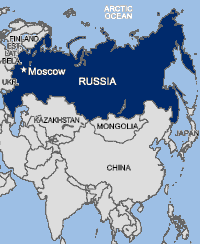Russia
Sustainable forest management can contribute significantly towards mitigating the effects of climate change on humans and ecosystems.
Background

Russia is blessed with an abundance of natural resources. It holds major reserves of oil, gas, and minerals. Vast Russian forests – 22% of the earth’s land – absorb carbon dioxide from the atmosphere, serving as a “carbon sink” that is vital to global environmental balance. They are also the habitat for rare and important biodiversity. Russia’s natural resources are key to much needed economic growth, but exploitation and poorly planned economic development have caused environmental problems at exorbitant costs.
USAID/Russia’s goal is to work in partnership with Russians to build a stable, healthy, democratic market economy, and to help Russia become a strong, reliable partner internationally. USAID programs focus on the critical issues of governance, civil society and health through local partnerships that help Russia better meet the needs of its population and engage positively on critical global issues. USAID works with Russian government authorities at all levels, and encourages collaboration among the government, corporate and civil society sectors.
Sector-Specific Climate Change Activities
Currently, USAID/Russia addresses global climate change issues through its support to the U.S. Forest Service (USFS). Forests play an important role in mitigating the effects of climate change; therefore establishing good management practices and avoiding deforestation are critical. USFS collaboration with Russia focuses on sustainable forest management topics, including inventory and monitoring, fire management, illegal logging, and watershed management, and directly relates to climate change.
USFS reinitiated a formal Forest Working Group with the Russian Federal Forest Agency (RFFA) in 2005 to cooperate on several topics of mutual interest, including forest inventory and monitoring, forest certification, fire management, illegal logging, and climate change. Russia is actively engaging in climate change dialogue, specifically the role of forests in climate change. In 2008, RFFA identified fire management and climate change as priority topics for cooperation.
USFS, in cooperation with European colleagues, has been providing input into RFFA’s revision of the national inventory system, at RFFA’s request. Ongoing, accurate, and transparent monitoring and inventory of forests is important to understand the effects of climate change on these ecosystems.
USFS has also worked extensively with Russia on wildfire management, including suppression and mitigation techniques, as well as research on greenhouse gas emissions from wildfire. Continued technical cooperation in this area will help build fire management capacity and prevent the loss of forest cover, ensuring that these forests continue to provide important carbon sequestration benefits.
USFS is also supporting Russia’s efforts to combat illegal logging through training and technical assistance on methodologies and tools such as best management practices, timber tracking, proper designation of boundaries, training in transparent timber sales and contracts and availability of forest information. In addition, in March 2008, USFS supported a workshop attended by Chinese and Russian participants, to promote transboundary dialogue on sustainable investment and trade in the forest sector. Combating illegal logging helps mitigate unaccounted loss of forests and carbon.
USFS also collaborates with partners in Russia to protect and restore important watersheds and wildlife habitat. Watershed protection measures mitigate threats of disaster, such as erosion and flooding, to both human populations and natural resources.
Sustainable natural resource and forest management activities, such as those USFS collaborates on in Russia, contribute to the mitigation of significant effects of climate change on humans and ecosystems.
Partners
USAID’s partners in climate change activities in Russia include:
- Russian Federal Forest Agency (RFFA)
- Russian Ministry of Natural Resources
- U.S. Forest Service (USFS)
Because partners change as new activities arise, this list of partners is not comprehensive.
Back to Top ^
|


